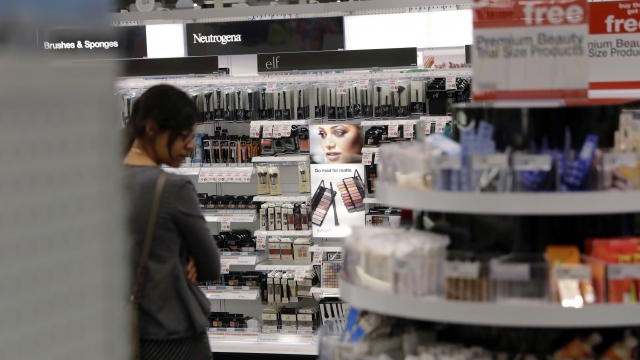The cosmetics industry encompasses tons of products: It's makeup, skincare products like cleansers and serums, creams, nail polish, hair care, baby products, sunscreens — the list goes on.
As Maddie Giles goes through her beauty routine — washing her face, applying foundation, mascara, blush — she trusts the products she uses every day and all that is in them.
Dermatologists say, generally, most of what we put on our skin is safe. But some studies, many of them in animals or labs, have linked certain cosmetic ingredients to allergic reactions, poisonings, damaged DNA, hormone disruption or increased cancer risk.
Experts say more research is needed, but in the meantime, folks like Giles do not have a simple way to know what's in their products or if there's been a safety concern.
"The jury's out on what the heck I'm rubbing on my face right now, so hopefully it's nothing that'll kill me," Giles said.
The FDA does not approve cosmetics the same way it does a drug. Though it does regulate cosmetics, the law classifies the two differently.
"If it intends to treat a disease, mitigate disease, prevent disease by law, that product is considered a drug," said dermatologist Dr. Fayne Frey. "A product that is meant to adorn and to beautify, that product is considered a cosmetic."
These beauty products don't need FDA approval before they hit the shelves, but the way the law allows the FDA to regulate them is getting a makeover.
Congress included legislation called "The Modernization of Cosmetic Regulation Act of 2022" in their big spending bill in December.
Now, the FDA can recall cosmetics containing harmful ingredients. Before, companies could do it voluntarily.
The FDA can also require manufacturers to follow good manufacturing practices, disclose their ingredients and have safety records for the products. Plus, cosmetics manufacturers now have to report serious adverse health events to the FDA within 15 days.
The regulations don't just protect adults.
"Baby's skin is much thinner than adult skin, and when you think about babies with those giant heads and little bodies, their body surface area to weight ratio is such that they are more prone to absorbing things through that thin skin that they have," said Dr. Sheilagh Maguiness, pediatric dermatologist and president-elect of the Society for Pediatric Dermatology.
The new rules don't ban specific ingredients — something that stands out when comparing the U.S. to other countries.
A 2021 report from the Environmental Working Group, a research and activism nonprofit, found dozens of countries had stricter cosmetic rules than the U.S.
On Jan. 30, the EU updated its list. It has banned 2,495 substances in cosmetics, while the U.S. has banned 11.
The Personal Care Products Council has said many chemicals on the EU list never would be used as a cosmetics ingredient here.
"Four hundred of those ingredients are fuel gases and petroleum byproducts," Dr. Frey said. "That list also includes drugs like warfarin and barbiturates and tar."
"I think it boils down to two main issues: First, the cosmetic industry having very active lobbyists in Washington that are very against enhanced regulation. And second, you have a regulatory agency, the Food and Drug Administration, who demands a very high level of proof showing definitive human harm before they can act and actually ban a substance," said dermatologist Dr. Aanand Geria.
Some states have gone further to ban more than the 11 ingredients. In 2020, California banned nearly 20 chemicals.
But the ingredient debate isn't an easy one to decipher.
"Just because you can't pronounce an ingredient doesn't necessarily mean it's dangerous," Dr. Geria said. "For example, the actual chemical name for water is dihydrogen monoxide."
Toxicity can also depend on how much of a chemical a person has been exposed to.
"A poison, a toxin — there's always a dose at which that toxin cannot hurt you, a tiny little dose," Dr. Frey said. "Our bodies need water, there's no doubt. But you consume six liters of water in a small sitting, you create a condition called hyponatremia. Your salt levels are low and the brain can swell, and it could be fatal. We have all kinds of chemicals, drugs and cosmetics that fit that scenario."
With the federal rule changes, there are still questions. For example, it does not set standards for terms like "clean beauty" or "natural," nor does it require companies to study the health impacts of long-term exposure.
If you're looking for ways to better understand your skin care, dermatologists say getting a patch test, which is different than an allergy test, to see what chemicals may irritate you. There are also several databases and apps which allow users to search through products. And when in doubt, a few products — with sunscreen at the top of the list — are all you really need in your routine.




